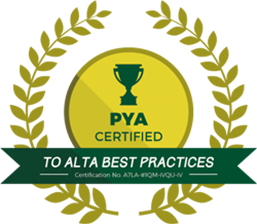
For many, buying a house loan-free is not an option, but there are many different loans to choose from, so which one is right for you? The abundance of mortgages available makes the purchasing process seem more complicated than necessary, but at Champion Title and Settlements, Inc. we are here to help.
There are five common types of home loans that you should be aware of, each one providing different benefits and downsides. These five mortgages include fixed-rate, adjustable-rate, FHA, VA, and USDA loan. Tackle this tricky first step in the settlement process and figure out what type of loan is just right for you below.
Fixed-Rate Loans
A fixed-rate loan is the most common of the above-mentioned loans and provides homeowners with one interest rate that they will pay monthly for the entirety of their loan. Most homeowners will take out fixed-rate loans for either 15 years or 30 years.
Fixed-rate loans are most suited to homeowners who are planning on staying in their property for a long period of time and who prefer some stability, even if it comes at a cost. Fixed-rate loans will most likely charge a higher interest than other types of loans, however that rate will never change.
The current average interest rates are 4.06% for a 15-year fixed-rate loan and 4.86% for a 30-year fixed-rate loan.
Adjustable-Rate Loans
For people that have low credit scores, buying a home and getting approved for a mortgage can be a headache. An adjustable-rate loan can help. An adjustable-rate loan begins with a fixed interest rate which will last for a certain period of time, perhaps five or ten years depending on the loan you choose, and then the interest rate will change annually. The interest on an adjustable-rate loan changes with national interest rates set by the Federal Reserve. This means that sometimes you’ll pay more interest than what you did for the original loan period, and sometimes you will pay less.
If you are planning on only staying in the home for a short period of time, an adjustable-rate loan is worth considering. Homeowners can often benefit from paying the typically lower initial interest rate and moving out before it transfers over to being an annual adjustable rate.
The current average rate for adjustable-rate 5/1 loans is 4.01 percent for the first five years.
FHA Loans
Although a home loan takes off most of the initial financial burden, most settlements will still require a down payment for the property. Down payments are typically 20 percent of the sales price, so if the house you are buying is listed at 250,000 dollars, you will be required to put down 50,000 dollars, which is a large sum of money. FHA loans, however, do not require such a large a down payment, and home buyers can often put down as little as 3.5 percent of the sales price. The downside to a FHA loan is that borrowers are required to pay
mortgage insurance which can increase their monthly payments. They are also often limited to a loan of approximately 400,000 dollars.
A FHA loan can be helpful for first-time buyers who may not have much saved up for the down payment. It can also be appropriate for buyers looking at homes with lower sales prices. FHA loans typically come with either a 15-year or 30-year fixed interest rate. Rates on these loans tend to be higher than those of traditional fixed-rate or adjustable-rate loans.
The current average FHA loan interest rate is 5.2 percent.
VA Loans
Did you serve in the United States Military? If the answer is yes, then a Veterans Affairs loan might be just right for your new property. VA loans require no down payment on the home and also do not require borrowers to pay mortgage insurance, so monthly payments will stay relatively low. Borrowers must have served either 90 consecutive days during wartime, 180 consecutive days during peacetime, or six consecutive years in the reserves to qualify for this loan. They must also meet certain property requirements including using the property as a primary residence. So if you are planning on buying a property for the sake of investing or fixing up, a VA loan is not the one for you.
VA Loans have a long list of requirements in addition to the one above so it is highly recommended that you do your research before committing to a VA loan. If you do meet all of the requirements, a VA loan is a great government backed program that can heavily assist in finding a home you can afford.
The current average VA loan 30-year interest rate is 5.01%. VA loans have a fixed-interest rate that you would pay monthly for the life of that loan.
USDA Loans
USDA Loans are offered by the government to families that live in rural areas. Much like the VA loan, this loan allows the family to have the home completely financed, therefore no down payment is necessary. However, to be approved for this loan the family debt load cannot exceed the family income by more than 41 percent and mortgage insurance must be purchased, which will increase the monthly payment rates.
If you live in a rural area and earn low to average income for said area, this may be the best option for you. The government also offers discounted interest rates on USDA Loans so monthly payments won’t be debilitating.
The current average USDA loan interest rate is 3.25 percent and is a fixed interest rate.
Now that you have figured out what loan is best for you, head over to www.championtitle.com to see how we can help you with the next steps in your purchasing process.










